Topic: Margin of Excellence

The Ladies Room – Conversation with Lana Oleen and Janis Lee, October 14, 2019
Interviewed by Joan Wagnon
The Ladies Room is a short Statehouse Conversation with former Kansas State Senators Janis Lee and Lana Oleen facilitated by former State Representative Joan Wagnon. The conversation centers around the culture of the Kansas Senate when Lee and Oleen served their first session in 1989. Altogether, eight new women Senators began their service that year. Lee and Oleen rose to leadership positions in their respective caucuses.
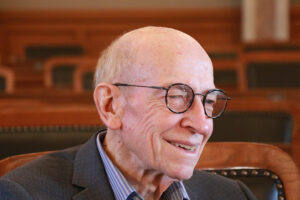
Interview of James (Jim) Maag, July 17, 2014
Interviewed by Burdett Loomis
In this 2014 oral history interview, Jim Maag reflects on his service in the Kansas House of Representatives (1969-1976) including his term as Speaker Pro Tem (1975-1976). It was a time of significant change and modernization of the Kansas Legislature and its processes. Maag provides a clear view into the evolution of the Legislature into a more professional organization. He comments on the bipartisan approaches to policymaking during that era when the urban-rural split affected the dynamic more often than purely partisan considerations. He was witness to the impact of the one person, one vote Show Morecourt case as well as the increased number of women legislators and the reduced number of attorneys. Jim's recollections draw a vivid picture of an institution in transition. His connection with the Legislature continued in his role of legislative liaison for Governor Bennett and later as a lobbyist for the Kansas Bankers Association.
A video recording of a portion of this interview is available on this site.
Show Less
Interview of Doug Mays, September 25, 2020
Interviewed by Alan Conroy
This interview with former Speaker Doug Mays contains good insight into how the Kansas House of Representatives functioned at the end of the Twentieth Century and the first decade of the Twenty-First. The institution was changing as its membership became more conservative. Mays describes in great detail how its leadership dealt with controversial issues such as school finance and taxation. Mays cites two issues as his proudest accomplishments: passing a sales tax to lower property taxes for Washburn University and neighborhood revitalization legislation. Speaker Mays notes that every time a bill came through, he read Show Moreit. His discussion of the power of the speaker is illustrated with numerous examples. “ I believed in the process. I believed that the speaker was the keeper, the protector of the process.” He promoted civility in the body and developed a good relationship with the Minority Leader Dennis McKinney which allowed him to end the 2005 Special Session without adjourning sine die. Mays promoted greater use of technology for the legislature and tightening of deadlines to ensure smooth operations. There are several examples of his relationship with governors. Anyone interested in being a speaker should read this interview. Show Less
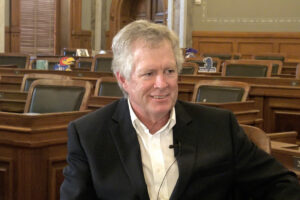
Interview of Dennis McKinney, August 23, 2019
Interviewed by Dale Goter
Dennis McKinney developed many insights in his sixteen years as a leader in the minority party into how the legislature did work, and how it should work. He recounts numerous instances when things worked well because of bipartisan cooperation and compromise. McKinney's experiences on the House Energy and Natural Resources committee working with Carl Holmes and Ken Grotewiel helped shape water policy in Kansas. His experience as a farmer and rancher in south central Kansas coupled with his focus on problem solving led to his reputation as a "middle of the road legislator" who would work Show Morewith both political sides as well as urban and rural. McKinney was committed to public education as well as conservation. The pursuit of fair and balanced tax policy shaped his actions. The interview highlights the importance of leadership from the governor's office and other legislative leaders (Mays, Shallenburger, D. Kerr, Morris). There is an interesting segment about the 2005 Special Session on school finance where McKinney talks about using the courts as leverage. The interview concludes with a brief discussion of the Greensburg tornado. Show Less

Interview of Robert (Bob) Miller, November 9, 2017
Interviewed by H. Edward (Ed) Flentje
Former Speaker of the Kansas House of Representatives, Robert (Bob) Miller recalls his many years of service to the State. He describes his involvement with the Young Republicans at K-State, his first campaign to represent his area of Sumner County, and moving up through the ranks in the House despite not having ambition for any other elected position. Miller reflects on his sometimes arms-length relationships with fellow House members and with lobbyists. From his position as chair of the House Federal and State Affairs Committee he oversaw the development of implementing legislation for liquor-by-the-drink, parimutuel wagering, and Show Morethe State Lottery by building subject-matter expertise within the committee. Miller describes instances when legislators' positions on policy issues did not break along purely partisan nor on purely urban-rural lines. He also witnessed the early development of what eventually became the conservative movement in the Legislature.
A version of this interview is also posted on KansasMemory.org, the website of the Kansas Historical Society. Show Less
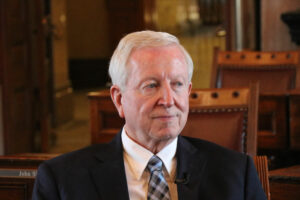
Interview of Steve Morris, July 15, 2020
Interviewed by Joan Wagnon
Senate President Steve Morris gives a lengthy and detailed account of his twenty years in the Senate and his eight years as president. A former Hugoton school board member, Morris challenged a 16 year incumbent Democrat (Leroy Hayden) and won by a 2:1 margin in the 1992 election. During this period there were several high profile issues which Morris championed. Casino gambling passed in 2007 after a 12 hour filibuster. A coal-fired plant (Sunflower Electric) in Holcomb wanted to expand but Governor Sebelius vetoed that bill, twice. The Special Session of 2005 dealt with a Show MoreSupreme Court order to increase education funding to constitutional levels which took 12 days to develop a consensus. A 2010 transportation plan was passed during a recession. Morris initiated a three-university plan to increase the number of engineers in the state by 65 percent beginning in 2011, assisted by Senator Carolyn McGinn. Governor Sam Brownback's "tax experiment" which was passed in 2012 took huge amounts out of the transportation plan to close budget gaps. The interview contains a detailed account of the shenanigans that took place after the Senate refused to pass the Brownback bill. The Governor pleaded with Morris to reverse their action and send the bill to conference, which Morris did, only to find the House concurring to pass the original bill. Morris ran again, but was defeated in a Republican primary.
Another oral history interview of Morris is included in the Energy & Environment collection on this site.
Show Less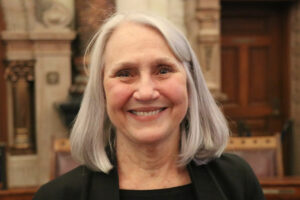
Interview of Nancy Parrish, October 23, 2020
Interviewed by Patty Clark
This 2020 oral history interview of former State Senator Nancy Parrish is packed full of information about people and policy between 1980 and 1992 in the Kansas Senate. She was one of the first, if not the first Democrat women elected to the state senate. Parrish talks about establishing her own identity after filling the unexpired part of her husband's term and winning the seat three more times while fostering a child, adopting a child, and attending law school at Washburn University. Her relationships with Republican senators allowed her to be effective in passing or shaping legislation. Show MoreParrish served on the conference committee to negotiate the 1992 school finance bill. Parrish also discussed her two years as Secretary of Revenue and working with Senator Gus Bogina to pass legislation to provide for purchase of a large-scale computer system for collecting taxes at the Department of Revenue. Parrish offers opinions on the importance of the separation of powers in the constitution, from her perspective as a former legislator, an executive branch administrator and a judge. For Parrish, each of these experiences has been a learning experience. She concludes the interview by expressing concern about the loss of "camaraderie" among legislators. Show Less

Interview of Marge Petty, September 11, 2020
Interviewed by Patty Clark
This oral history interview of former Senator Marge Petty covers her 12 sessions in the State Senate representing a Topeka district (Senate 18). Petty talks about why she registered as a Democrat, challenged a sitting Republican woman Senator in the 1988 election, and won. She discusses specific issues such as the investigation of the KPERS venture capital investments with other Senators, healthcare issues, foster care, and education. The interview also chronicles her career after leaving the legislature in 2000. Petty talks candidly about losing that last election, after which she began working for the Kansas Corporation Show MoreCommission. Later, she decided to move back to Dallas and worked to secure an appointment from President Obama as a regional representative of Health and Human Services. Petty describes the process of going after that appointment. This is a wide-ranging interview that shows the energy and skills Petty brought to the public arena. Show Less
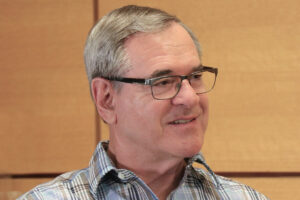
Interview of David Pope, September 19, 2019
Interviewed by Rex Buchanan
In this 2019 oral history interview, David Pope described how the awareness of declining water levels in the High Plains Aquifers in Kansas led to efforts to support wise use and responsible management of groundwater in the state. He described being hired to address groundwater issues from the local perspective and how he was involved in the creation the Groundwater Management District (GMD) in southwest Kansas. As Assistant Chief Engineer of the Department of Agriculture’s Division of Water Resources and later Chief Engineer, Pope was involved in a state policy limiting new groundwater development, referred to as planned Show Moredepletion, along with efforts to develop regulations on water management to replace the prior ad hoc approach. Pope discussed his dealings the U.S. Army Corps of Engineers in assuring minimal desirable streamflow to satisfy municipal and industrial water users along with conservation and recreation interests. He observed the complex interplay of surface and groundwater use policies which became a politically highly charged issue in addressing the Cheyenne Bottoms wetlands issue, Pope explained how the water law premise of "first in time, first in right" has been modified with amendments and regulations that require the filing of water rights, development of conservation plans to assure the beneficial use of water, mandatory metering of water use, and closure of areas for new water rights, all based on hydrologic studies. He concluded that although some GMDs have not tackled long-term depletion problems in western Kansas, two districts have adopted successful strategies: safe yield rules adopted by Groundwater Management District No. 2, and the creation of the Local Enhanced Management Area (LEMA) in Sheridan County to regulate irrigation. Pope described those successes and speculated on why others have not been as successful. Show Less

Interview of Jo Ann Pottorff, October 9, 2020
Interviewed by Patty Clark
Former Kansas State Representative Jo Ann Pottorff describes her best legislative work as getting the Parents as Teachers program passed. With her background in education, she saw opportunity for this program to make a difference for children. Pottorff’s policy interests were education, financing the work of the legislature, and funding schools. In order to pursue those interests, she secured an assignment to the House Appropriations Committee early in her tenure. Over the course of her service in the Legislature her interests broadened. Pottorff was assigned to the Joint Committee on State Building Construction, which she chaired for a Show Moretime, and as a member of that Committee was involved in the renovation of the Capitol building. At the national level, Pottorff worked with National Conference of State Legislators (NCSL) and the Women's Legislative Network which allowed her to meet other women in office and to travel internationally, to Korea, Japan, Taiwan, and Germany. Pottorff describes the changes in the culture of the legislature during her years of service (1985-2012). She notes the rise in partisanship and inter-party divisions evidenced by the fact that she was often targeted in a Republican primary election when she sought renomination. Show Less
